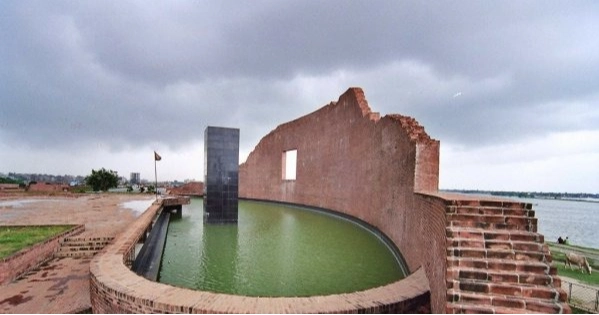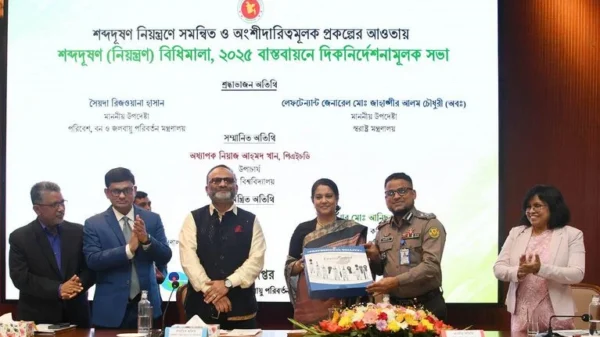Staff Reporter:
What if someone told you that the entire water of Dhanmondi Lake can be filtered within 21 hours? That too through freshwater mussels?
You read right. What many may not be aware of is that mussels act as super-filters – each mussel can filter between 10 and 20 gallons (37.85-75.7 liters) of water every day.
Remarkable information on the humble mussel’s key role in improving water quality and aquatic environments came about during a conversation with Dr David C Aldridge and Dr Gawsia Wahidunnessa Chowdhury.
Dr David C Aldridge, a Professor at Cambridge University’s Department of Zoology, whose work focuses on applied freshwater ecology with a particular emphasis on bivalve mussels, oysters, clams were in Dhaka recently.
While in Dhaka, Dr Aldridge gave a presentation at the Department of Zoology of Dhaka University. He also guided a group of MS and MPhil students of DU’s Department of Zoology who will be working in the field over the next 1-2 years.
His work has attracted a number of awards, including the World Bank’s Development Award (2006) for sustainable improvement of water quality in developing countries and the Entec Medal (2007) for contributions towards environmental protection.
Dr Chowdhury is a Professor of zoology at the University of Dhaka, who obtained her PhD in Zoology (wetland ecology) from the University of Cambridge. A Commonwealth Academic Staff Scholarship and a Wildlife Conservation Society Fellowship are just two of the several honours and scholarships she has received. She works with government, non-government and international organizations. She is a board member of the international conservation organization WildTeam.
Her work focuses on conservation of aquatic ecosystems and threatened species in Bangladesh.
While talking at WildTeam’s office at Cosmos Centre in Dhaka, Dr Aldridge and Dr Chowdhury elaborated about their work in Bangladesh.
Talking about his research in China, Dr Aldridge said, “We worked on declining water quality, comparable to that in Bangladesh. A lot of the lakes, both in Bangladesh and China, suffer from heavy nutrient enrichment – driving algae abundance in the water and a decline in biodiversity.”
“My work in China with the World Bank was very much about using natural filter features to remove the algae in some of the lakes and restore the systems towards a cleaner water status. And the work was incredibly successful. We actually managed to clear the water in some lakes using native freshwater mussels that are really important filter feeders,” he went on.
“The results were so effective and the water became so clear that plants started to grow on the banks of the lakes that hadn’t been seen for over 30 years. These plants then created a habitat for native invertebrate, and that was better food for fish.
“One of the things we’re trying to do in Bangladesh is to develop a similar approach where we encourage important ecosystem engineers like freshwater mussels that can help in developing better quality habitats for all sorts of other aquatic life,” Dr Aldridge said.
Referring to their work in Dhaka, he said, “Dr Chowdhury did some very important work for her PhD, looking at the roles that the native freshwater mussels could play in supporting biodiversity in Dhanmondi Lake, which is one of the larger lakes in Dhaka.”
“We’re very interested in looking at whether we can encourage freshwater mussels to restore the degraded water quality, to make better quality ecosystems. And we also want to combine that with growing pearls in the freshwater mussels so that local people get an enhanced livelihood,” he added.
With an additional source of income, degraded water bodies can be restored and everyone wins, Dr Aldridge and Dr Chowdhury were of the opinion.
Talking about her PhD project, Dr Chowdhury said, “During the dry season, we looked at the function of mussels in the Dhanmondi Lake near shore zone. Mussels were abundant when 50 locations, between one and three meters from the shore, were sampled. According to our calculations, mussels can filter the lake’s water in just 21 hours. And it is done by two species of freshwater mussels.”
Not all lakes and water bodies in Dhaka are in as promising condition as Dhanmondi Lake, however, according to the researchers.
They visited several lakes and rivers in and around Dhaka and observed that the mussel populations are perhaps declining.
Some lakes in Dhaka have no mussels at all. The water is too polluted, and that is cause for concern, they said.
Regarding the prospect of encouraging freshwater mussel population growth to restore degraded water quality and combining that with pearl farming, the duo visited Bangladesh Fisheries Research Institute (BFRI) facilities that play a significant role in cultured pearl.
“We met the BFRI DG, and visited their farm. We’re hoping to set up a collaboration between BFRI and my research group at Cambridge University as well as Dr Chowdhury’s team, so that we can help to collectively develop this project,” Dr Aldridge said.
There are, however, challenges that pose threats to the aquatic “super filters”.
According to Dr Aldridge and Dr Chowdhury: Freshwater mussels are very important in ecosystems because as filter feeders, they remove algae from the water that helps to push freshwater ecosystems away from low oxygen, low biodiversity state. But this also relies on freshwater mussels being healthy and being able to live in those ecosystems.
In Bangladesh’s southwest coastal region, increased salinity of water bodies – linked to climate change – might interact with their ecosystem engineering functions. The more stressed mussels are, the less effective they are going to be as ecosystem engineers. This also affects the mussel population.
How adaptable the mussels might be will be a decisive factor in this regard. If the rate of change in salinity in the rivers is quite modest, the mussels can adapt and respond. If there are sudden changes, then the mussels may not be able to survive, resulting in a collapse in the ecosystem services.











































